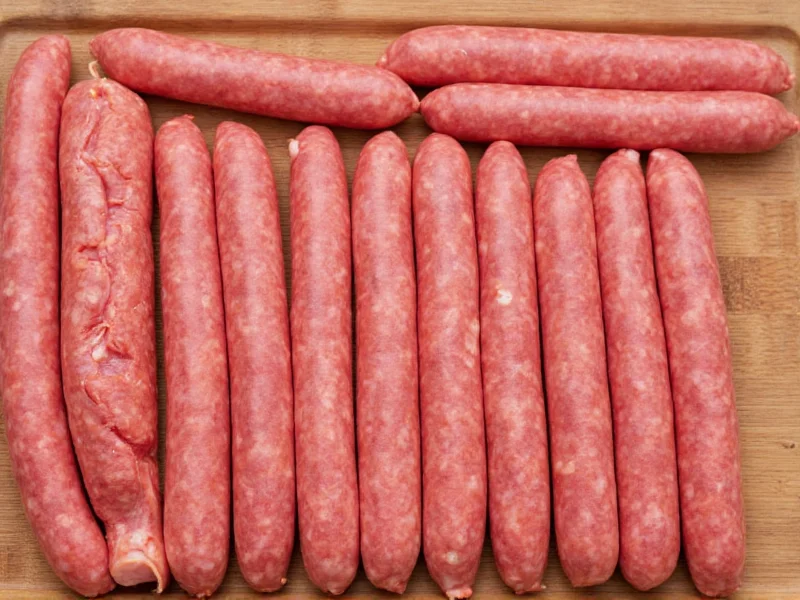Proper food storage prevents waste and protects your health. Understanding how long sausage lasts in the fridge helps you make informed decisions about meal planning and food safety. This guide provides evidence-based storage timelines backed by USDA food safety standards.
Understanding Sausage Shelf Life in Refrigeration
Sausage storage duration depends on multiple factors including preparation method, ingredients, and storage conditions. The critical temperature range for food safety is between 40°F and 140°F – the “danger zone” where bacteria multiply rapidly. Keeping your refrigerator at or below 40°F significantly extends sausage freshness.
Sausage Refrigeration Guidelines by Type
Different sausage varieties have distinct shelf lives due to processing methods and ingredients. Here's a detailed breakdown of how long different sausages last in the refrigerator:
| Sausage Type | Refrigerator Storage Time | Optimal Temperature |
|---|---|---|
| Raw fresh sausage (pork, beef, chicken) | 1–2 days | 40°F or below |
| Cooked sausage (homemade or store-bought) | 3–4 days | 40°F or below |
| Smoked sausage (unopened package) | Up to 2 weeks | 40°F or below |
| Smoked sausage (opened package) | 7 days | 40°F or below |
| Pre-cooked sausage (unopened) | 2 weeks | 40°F or below |
| Pre-cooked sausage (opened) | 7 days | 40°F or below |
Identifying Spoiled Sausage: Critical Warning Signs
Even within recommended timeframes, sausage can spoil prematurely. Recognize these signs your sausage has gone bad in the fridge:
- Texture changes – Slimy or sticky surface indicates bacterial growth
- Odor deterioration – Sour, rotten, or ammonia-like smells replace normal meat aroma
- Color shifts – Grayish hue or green spots signal spoilage
- Mold appearance – Any visible mold means immediate disposal
- Package swelling – Bulging packaging indicates gas-producing bacteria
When in doubt, throw it out. Consuming spoiled sausage risks foodborne illnesses like salmonella or listeria.
Maximizing Sausage Freshness: Storage Best Practices
Follow these proper sausage storage techniques for extended freshness to get the most from your purchase:
- Keep sausage in original packaging until ready to use
- Place raw sausage on the bottom shelf to prevent cross-contamination
- Transfer opened packages to airtight containers within 2 hours
- Use refrigerator thermometer to verify consistent 40°F temperature
- Store sausage away from strong-smelling foods to prevent flavor transfer
- Label containers with purchase or opening date for easy tracking
Freezing Sausage for Long-Term Storage
When you need to extend how long sausage stays good beyond refrigerator limits, freezing provides an effective solution:
- Raw sausage maintains quality for 1–2 months in the freezer
- Cooked sausage stays fresh for 2–3 months frozen
- Vacuum-sealed packages prevent freezer burn
- Thaw frozen sausage in the refrigerator, not at room temperature
- Never refreeze sausage that has been completely thawed
Food Safety Considerations for Sausage Consumption
Understanding proper sausage handling to prevent foodborne illness protects your health. The USDA recommends cooking raw sausage to an internal temperature of 160°F (71°C). Leftover cooked sausage should return to the refrigerator within 2 hours of cooking – 1 hour if room temperature exceeds 90°F.
High-risk groups including pregnant women, young children, older adults, and immunocompromised individuals should exercise extra caution with sausage consumption. When determining how long cooked sausage lasts in the fridge after preparation, always prioritize the shorter end of recommended timeframes for vulnerable populations.
Common Questions About Sausage Refrigeration
How long does Italian sausage last in the refrigerator after opening?
Opened Italian sausage remains safe to eat for 3–4 days when stored properly in the refrigerator at 40°F or below. Place it in an airtight container immediately after opening and keep it on a lower shelf to prevent cross-contamination with ready-to-eat foods.
Can you eat sausage that's been in the fridge for a week?
It depends on the sausage type. Raw fresh sausage becomes unsafe after 2 days, while cooked or smoked sausage may remain safe for up to 7 days. Always check for spoilage signs like sour odor, slimy texture, or color changes regardless of timeframe. When in doubt about how long sausage is good for after the sell-by date, discard questionable products.
Does vacuum-sealed sausage last longer in the refrigerator?
Yes, vacuum-sealed sausage typically lasts 1–2 days longer than conventionally packaged sausage. Unopened vacuum-sealed raw sausage stays fresh for 2–3 days, while smoked varieties can last 2–3 weeks. Once opened, vacuum-sealed sausage follows standard refrigeration guidelines of 7 days maximum regardless of initial packaging.
How can you tell if cooked sausage has gone bad?
Spoiled cooked sausage develops a sour or unpleasant odor, becomes slimy to the touch, and may show grayish discoloration. If you notice any mold growth or the sausage has been in the refrigerator longer than 4 days, discard it immediately. Never taste questionable sausage to determine freshness – this practice risks foodborne illness.
What's the difference between 'use by' and 'sell by' dates for sausage?
The 'sell by' date indicates when retailers should remove the product from shelves, while 'use by' represents the manufacturer's recommendation for peak quality. For sausage safety, follow these guidelines: raw sausage should be cooked or frozen within 1–2 days of the 'sell by' date, while cooked sausage remains safe for 3–4 days after the 'use by' date if properly stored. Always prioritize visual and olfactory spoilage indicators over date labels.











 浙公网安备
33010002000092号
浙公网安备
33010002000092号 浙B2-20120091-4
浙B2-20120091-4